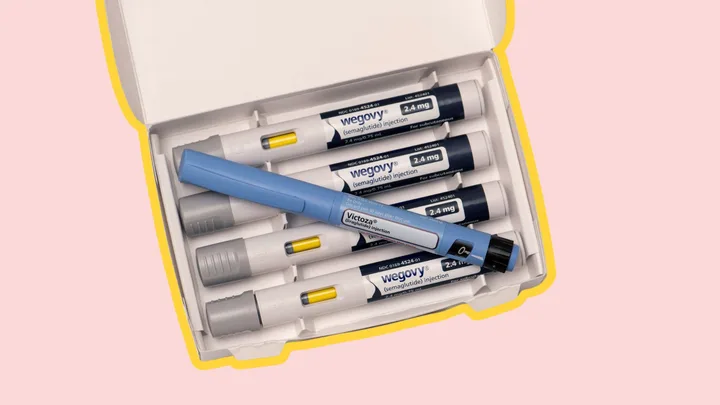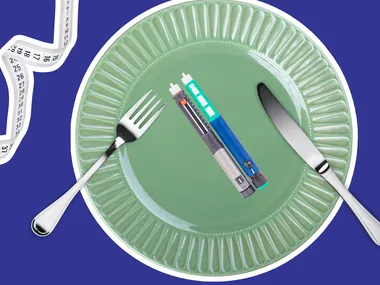We’re currently in the era of Ozempic. Just ask best-selling author and researcher Johann Hari, who has just written an entire book on the topic. The idea for the book began when he went to a party at the home of an Oscar-winning actor in Los Angeles. It was the winter of 2022 and the world was emerging from a Covid-induced haze.
“In the Uber there, I remember feeling self conscious because – like a lot of people – I’d gained weight during lockdown,” recalls Hari. “I imagined walking into a roomful of celebrities who’d done the same.” Only, that wasn’t what happened. “I arrived and it was the weirdest thing,” he continues. “It wasn’t just that they hadn’t gained weight, they looked sharper and clearer. They looked like their Snapchat filters.”
When Hari remarked to a friend that there must have been an uptake in Pilates, the friend laughed before pulling out her phone to show him a picture of a blue Ozempic pen. The penny dropped – it wasn’t the Pilates.
What Is The Active Ingredient Of Ozempic?
The active ingredient of Ozempic is semaglutide, and it’s at the heart of a new wave of weight-loss drugs whereby users inject themselves weekly with a needle. Given that 47 per cent of Americans now want to use these drugs and there are predictions that one in four of the British population will be taking these drugs in just a few years, it’s not surprising that they are at the centre of one of the most complex health debates we’ve ever seen.

In Australia, semaglutide was approved in 2019 for use by adults with type 2 diabetes. The drug, which can also be taken orally, works to not only lower blood sugar but to support the pancreas to make more insulin (which is what diabetics lack). It also mimics the hormone GLP-1, which gives us a feeling of satiety and makes us feel full. Someone taking one of the new drugs is likely to lose up to a quarter of their body weight in six months.
As a best-selling author who has dived deeper than most on topics ranging from how we lost the ability to connect with one another to how our focus has been stolen from us by big tech, Hari was both fascinated and conflicted by what he observed that night in LA. His curiosity led him to write his latest book, Magic Pill: The Extraordinary Benefits and Disturbing Risks of the New Weight Loss Drugs, which saw Hari interview more than 100 leading experts – spanning the biggest critics to the biggest defenders of the drugs and everyone in between – around the world.
What Are The Benefits Of Weight Loss Drugs?
“On the one hand I could immediately see the benefits of this,” he explains. “A lot of the men in my family get really fat and die of heart attacks. I’m older now than my grandfather ever was, because he died of a heart attack at the age of 44.
My uncle also died of a heart attack. My dad had to have a quadruple heart bypass. I know that sadly obesity causes all sorts of health problems, in fact, it makes it more likely that you’ll get over 200 known diseases and complications. Anything that reverses or reduces this is going to have obvious benefits.”
On the flip side, self-proclaimed “miracle” weight-loss drugs have been around for decades and, for the most part, either don’t work or have shocking after-effects. “People have rushed to take them and then it has been discovered that there’s some horrific side effect and it has to be withdrawn from the market,” says Hari.
There’s the risks to consider but also the crippling effect these new drugs are having on diet culture. “What about all the progress we’ve made in body positivity and accepting a broader range of body shapes? What about people with eating disorders? And at a much more basic level, can you really have a free lunch? Can you really get all these benefits without any costs? It just seemed to me implausible.”
Using drugs to diet is nothing new. What is new is the dramatic rise in weight gain and the health problems this obesity epidemic has caused. Back in 1979, the year Hari was born, 6 per cent of British people were obese. Today, it’s 28 per cent. “Between the year I was born and the year I turned 21, obesity doubled in the US and then in the next 20 years, severe obesity doubled again.
What Has Lead To The Current Obesity Epidemic?
“This has never happened before in the history of human beings,” he says. For Hari, this extraordinary transformation leads to two key questions. Firstly, why did we gain so much weight so quickly? And secondly, how do these new weight-loss drugs work? To answer them, Hari wanted to explore the concept of satiety: “the feeling of having had enough and not wanting any more”. He learnt that “this concept is really important for understanding why so many of us became obese and how these drugs work.”
We know what causes obesity to rise in a society. It’s not a lack of willpower or being greedy. “It’s when people move from mostly eating fresh whole foods to mostly eating factory-assembled foods that are constructed out of chemicals in a process that isn’t even called cooking, it’s called manufacturing,” explains Hari. He notes a clear distinction between fresh food and factory food – the latter doesn’t ever give us satiety. “These drugs work to boost your sense of satiety. They give you back that feeling of being full,” he continues.
“In fact, one of the scientists who played a key role in designing them, describes what they give you as satiety hormones. The way one scientist put it to me is that these drugs are an artificial solution to an artificial problem. Processed and ultra-processed food undermined our satiety and these drugs give it back to us.”
So, supporters of the weight-loss drugs believe they are essentially a weapon against a huge problem we’re grappling with globally and that is: we’ve built a food system that poisons us and we’re addicted to it. We’re addicted to the convenience of this fast, ultra-processed food, and many of us are too busy and stressed to care.
“We’re fighting against this enormous machinery that gets in before you are even consciously aware,” explains Hari. “I think about my own childhood where I ate almost nothing but processed junk food. My dad would occasionally try to violently feed me a vegetable, but my mum and grandmother were working-class women with hard lives. The day we got a microwave was the happiest day of my nan’s life. The food I grew up eating left me with this feeling of never being full.”
How Do These Drugs Influence Our GLP-1 Hormones?
The key hormone these drugs influence is GLP-1. “If you ate something now – it doesn’t really matter what it is – after a while your pancreas would produce a hormone called GLP-1,” says Hari. “GLP-1 is basically part of your body’s natural system, [which tells you] ‘You’ve had enough, stop eating’. Natural GLP-1 floods your system for a couple of minutes and then it goes away, at which point you can eat again, or you can eat through it if you’re really determined … What these drugs do is they inject an artificial copy of GLP-1 into your body, which, instead of being washed away in a few minutes, stays in your system for a whole week.”
Given the history of heart attacks in his family, and that he was deemed clinically obese, Hari started taking Ozempic in 2023. “Two days after I started taking it, I woke up and felt strange,” he recalls. “It took me about five minutes before I realised I wasn’t hungry.” Hari went to a cafe near home and – on autopilot – ordered his usual meal: a big chicken bap with “loads of chicken and mayo in it”. He took a few mouthfuls and was satiated. He felt full.
What Are The Biggest Risks Of Drugs Such As Ozempic?
Hari’s book isn’t a pro weight-loss drugs book. Far from it. He admits he still doesn’t have the answers. What he does have, though, are the facts, including the many risks associated with these drugs.
Hari has identified 12 big risks related to these drugs and goes into great detail on what they are in his book. To start, some side-effects might include loss of lean muscle mass, pancreatitis, rapid heart beat, fatigue, hypoglycaemia, abdominal pain, dizziness, allergic reaction, blurred vision, nausea, gas, burping, gallstones and diabetic retinopathy.
In Magic Pill, Hari refers to a French professor named Jean-Luc Faillie. He was commissioned by the French medicines agency to investigate the safety of these drugs. He reported that if you give them to rats, they’re much more likely to get thyroid cancer (humans also have GLP-1 receptors in our thyroid). He then looked at a large number of people who were diabetics and had been taking Ozempic between 2006 and 2016, and he compared them with a comparable group of diabetics who had not taken these drugs.
“What he found is pretty sobering,” says Hari. “If his research is right and it’s contested, whatever your thyroid cancer risk was at the start, it will increase by 50 to 75 per cent. Some scientists say, ‘Well, thyroid cancer is rare. [Only] 1.2 per cent of people get it and [most] of them survive.’ Nonetheless, it’s a pretty fucking big increase and a relatively small risk. Anyone who’s reading this article who has thyroid cancer in their family, I would strongly recommend they don’t take it.”
Again, it’s important to note that for those who are obese – knowing that obesity is one of the biggest causes of cancer – these drugs could lower their risk of cancer.
How Will Weight Loss Drugs Impact People With Eating Disorders?
There are also many questions and concerns as to how these drugs will impact the billions of people globally with eating disorders. “Of all the worries I have about this, it’s one of the top three,” says Hari. “I’m extremely alarmed about it. We know that before the pandemic, eating disorders were at historically unprecedented levels in Australia, Britain and the US. Then during the pandemic it got even worse, with skyrocketing levels of eating disorders in young girls. (There’s some young boys [too] but it is overwhelmingly girls.) These drugs are an unprecedentedly powerful tool to amputate your appetite. Anyone who’s known people with anorexia knows there’s a conflict going on within them between the psychological forces driving them
o punish their bodies and starve themselves and the physical desire to stay alive and eat.
What these drugs would do in that context is to empower the psychological forces and weaken the biological forces and that’s horrifying.” There is already evidence that young women are getting hold of these drugs because prescriptions are still largely unregulated, not to mention an emerging counterfeit market.
For Hari, the worst moment in writing the book was when his 19-year-old niece asked him for Ozempic. “I thought she was joking [at first],” he recalls. “She’s a perfectly normal, healthy weight. I thought, ‘Fuck. Have I undermined every message I’ve tried to give her from when she was born?’ Not being valued [by] how you look. Not venerating thinness. I felt sick about it because we know that when you change the individual. It’s the fault of the processed food industry.”
Who Is A Suitable Candidate For Weight Loss Drugs?
Our addiction to quick fixes is one of our biggest roadblocks. We don’t like to wait. These drugs offer a solution for those for those who might not medically need them but want to shed a few kilograms. Who needs willpower when you have Ozempic? This is the most worrying part: that people who are a normal, healthy weight will see these drugs as an option.
“I do think there’s a huge difference between people who are overweight or obese who are using these drugs to come down to a healthy weight, versus people who are already slim using them to be super thin. It’s those people who are causing the cultural problem, while also causing health problems for themselves,” says Hari. “If you’re already a healthy weight or slim, please don’t take the drug for your own sake and for the sake of all the girls around you.”
There’s also the fact that all good things must come to an end, which is why 80 per cent of diets fail. When you come off a weight-loss drug, your appetite returns, and so too does the weight. As the author of Unshrinking, Kate Manne writes, “dieting keeps many of us on a perpetual treadmill. We fall off periodically.
But we keep getting back on. Perhaps we are hoping to be the exception to the rule that dieting does not make us thinner in the long run.” None of us are the exception, Manne concludes, noting that diets only make us hungry and irritable “and fixated on the foods we can no longer enjoy or must at least restrict severely. It disposes many people to mental health problems such as anxiety, depression and, troublingly, eating disorders.”
Do Weight Loss Drugs Impact Your Mental Health?
Hari, who is still taking Ozempic, says that while the weight loss has been dramatic, he hasn’t seen an improvement in mental wellbeing, meaning that losing weight isn’t a silver bullet to happiness. “I didn’t feel better. If anything, I felt slightly worse,” he says. “I wasn’t depressed but I felt muted.
A lot of people seem to be anecdotally reporting this. There’s even some doctors who worry, although this is disputed, that it may cause depression or suicidal thinking. There’s a big debate about why that might be.” For Hari, these drugs, radically disrupt your eating patterns and, in doing so, can force to the surface some of the underlying emotional issues that drove your eating patterns in the first place.
“Going right back to when I was very young, I ate to calm myself down … and actually stopped myself being angry. I used [eating] almost like a tranquilliser,” he says. “I couldn’t do that when I started taking Ozempic. I mean, you can try to force yourself to eat, but you would throw up.”
Weight is just one part of the equation here. Drugs such as Ozempic might satiate us, but it can’t fix our fractured emotional relationship to food. Professor Carel Le Roux, who has done a lot of work with bariatric surgery, said to Hari, “What happens to a lot of people is they lose the weight and realise, ‘Oh, my husband is still an asshole and I’m still stuck in a job I hate.’ They realise this thing they thought was the solution is not the solution to all their problems.”
Hari says, “You have to weigh the risks of continuing to be obese against the risks of these drugs. I don’t have a simple answer on that.” But he is clear on who is and isn’t a candidate for these drugs: “if you are a normal healthy weight, you absolutely shouldn’t do it because you’re taking on all the risks but you don’t need the benefits. You’re not overweight.”
The topic is complicated, which is why Hari admits he is still searching for all the answers and fighting against the forces influencing obesity rates. “Obesity is, on average, disastrous for your health,” he says. “It’s not the fault of the individual. It’s the fault of the processed food industry.”
‘Magic Pill: The Extraordinary Benefits and Disturbing Risks of the New Weight Loss Drugs’ is available now, $22, at Amazon.com



